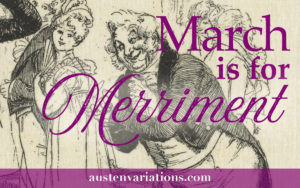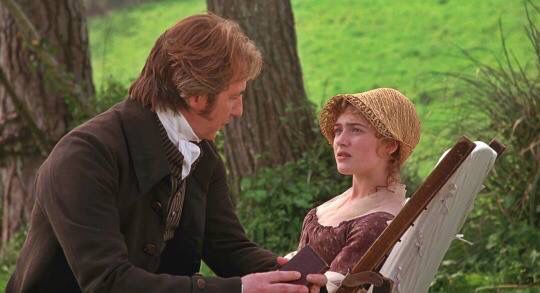 “MARCH MERRIMENT” has been selected as the theme for this month here at the blog, which we author members are each free to use as inspiration or ignore completely when we write our posts. I often take advantage of the monthly themes, but I wasn’t quite sure what to do with this one. And so, where did I turn for answers? To Jane Austen, of course!
“MARCH MERRIMENT” has been selected as the theme for this month here at the blog, which we author members are each free to use as inspiration or ignore completely when we write our posts. I often take advantage of the monthly themes, but I wasn’t quite sure what to do with this one. And so, where did I turn for answers? To Jane Austen, of course!
I conducted a word search for “merriment” throughout her body of work, expecting to find lots of fun and happy stuff. Obviously! Because this is the definition: fun and enjoyment marked by noise and laughter.
The word turns up in her work 8 times: once in Sense and Sensibility, four times in Mansfield Park, twice in Emma, and once in Northanger Abbey. Surprisingly, not one of these is on a happy occasion! At least as I take it, the word is either…
- …used sarcastically to demonstrate a lack of sense:
and in visiting her poultry-yard, where, in the disappointed hopes of her dairy maid, by hens forsaking their nests, or being stolen by a fox, or in the rapid decrease of a promising young brood, [Charlotte] found fresh sources of merriment. (S&S)
2. …used as a euphemism for mean-spirited teasing or bullying:
Edmund was uniformly kind himself; and [Fanny] had nothing worse to endure on the part of Tom than that sort of merriment which a young man of seventeen will always think fair with a child of ten. (MP)
3. …used to emphasize the increased misery of one person by contrasting it with the thoughtless frivolity of others:
A happy party it appeared to [Fanny], all interested in one object: cheerful beyond a doubt, for the sound of merriment ascended even to her. It was a sound that did not make her cheerful; she wondered that Edmund should forget her, and felt a pang. (MP)
For the first seven miles Miss Bertram had very little real comfort: her prospect always ended in Mr. Crawford and her sister sitting side by side, full of conversation and merriment; and to see only his expressive profile as he turned with a smile to Julia, or to catch the laugh of the other, was a perpetual source of irritation… (MP)
4. …used to describe fun that’s been anticipated (putting on the play at MP, the Box Hill picnic, attending a play at Bath), but now lost:
There was little time, however, for the indulgence of any images of merriment. It was necessary for [Tom Bertram] to step forward, too, and assist the introduction [of Sir Thomas to Mr. Yates], and with many awkward sensations he did his best. (MP)
Even Emma grew tired at last of flattery and merriment, and wished herself rather walking quietly about with any of the others, or sitting almost alone, and quite unattended to, in tranquil observation of the beautiful views beneath her. (Emma)
…the sudden view of Mr. Henry Tilney and his father, joining a party in the opposite box, recalled her to anxiety and distress. The stage could no longer excite genuine merriment – no longer keep [Catherine’s] whole attention. (NA)
5. …or to denote being made the butt of jokes, ridiculed.
Mr. Knightley and Harriet Smith! – Such an elevation on her side! Such a debasement on his! It was horrible to Emma to think how it must sink him in the general opinion, to foresee the smiles, the sneers, the merriment it would prompt at his expense…
What’s going on here? Did “merriment” mean something completely different in 1800, or did Jane Austen get the definition wrong? No. It’s just another example of Austen’s skillful and creative use of language.
Writing “merriment” to describe a happy scene would be too obvious, too pedantic. Anybody can do that. By the same token, anybody could write that Charlotte Palmer is ridiculous, Tom Bertram teased Fanny when she was young, and that the Box Hill picnic quickly turned sour. How much more clever, creative, and entertaining to get those messages across the way Jane Austen chose to do it! It’s one more example of her witty-but-slightly-biting narrative style. Part of what we love about her writing.
Still, I’m a little surprised that she didn’t use such a fun word to describe a happy occasion at least once! When I looked for how Austen used the related word “merry”, it’s much more of a mixed bag. Sometimes it’s used straight to show real joy, sometimes in irony, and sometimes to reveal silliness, as in my favorite:
“Oh! Mary,” [Lydia] said, “I wish you had gone with us, for we had such fun! …And then when we came away it was such fun! I thought we never should have got into the coach. I was ready to die of laughter. And then we were so merry all the way home! we talked and laughed so loud, that anybody might have heard us ten miles off!” (P&P)
Now that’s merriment!
Progress Report: My big news is that the first draft of Colonel Brandon in His Own Words is finished! I don’t say “rough draft” because it’s already pretty refined, at least I think so. Soon, I will send it out to a few beta readers for their feedback, and then we shall see. (For more info about the book, see this and other posts at my website/blog.)


6 comments
Skip to comment form
What a merry analysis of the merriments in Austen’s works!
Her twists of word always provide us the merriment we need in life, as well as her backhanded compliments!
Thank you for sharing with us.
Looking forward to “Colonel Brandon in His Own Words”!!
Author
Glad you enjoyed it, Patricia. Thanks for stopping by and commenting!
Well that wouldn’t have been my definition of merriment, that must be why I’m not a writer, Jane obviously had the ability to read more into different words!
I’m surprised there was no merriment in P&P! Especially during the visits to Rosings 🤔😂🤣
Author
Yes, Glynis, I was quite surprised by what I found, even though I obviously had read all of those examples before and wasn’t shocked. Always something new to discover with Jane Austen!
That is quite a list you have there. Sir Middleton and Mrs. Jennings always seemed ready for a laugh… at someone else’s expense. Mr. Yates was certainly disappointed when his idea of merriment [with his theatricals] was interrupted with the early arrival of Sir Thomas from his travels. Wishing you all success on this new launch. Blessings.
Author
Thanks so much for the good wishes and for stopping by!